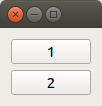PyQt excepthook
Today I learned the hard way that exception tracebacks are sometimes cut off
by PyQt. Say you have a Python function f() that calls a Qt
function g() which in turn ends up calling another Python
function of yours, h(). If an error happens in
h(), you'd expect to get the following traceback:
Traceback (most recent call last): File ..., line ..., in f() File ..., line ..., in g() File ..., line ..., in h() Exception
Instead, you only get:
Traceback (most recent call last): File ..., line ..., in g() File ..., line ..., in h() Exception
The fact that f() is missing can sometimes make debugging very
difficult.
The following code can be used to reproduce the problem:
from PyQt5.QtWidgets import *
from PyQt5.QtCore import Qt
class Window(QWidget):
def __init__(self):
super().__init__()
b1 = QPushButton('1')
b2 = QPushButton('2')
b1.clicked.connect(self.f1)
b2.clicked.connect(self.f2)
layout = QVBoxLayout(self)
layout.addWidget(b1)
layout.addWidget(b2)
self.setLayout(layout)
def f1(self, _):
self.inputMethodQuery(Qt.ImAnchorPosition)
def f2(self, _):
self.inputMethodQuery(Qt.ImAnchorPosition)
def inputMethodQuery(self, query):
if query == Qt.ImCursorPosition:
self.h()
else:
return super().inputMethodQuery(query) # Call 'g()'
def h(self):
raise Exception()
app = QApplication([])
window = Window()
window.show()
app.exec()
When you run it, you get the following app:

Clicking on any of the two buttons results in the error below. Note how we don't get any indication as to which button was clicked:
Traceback (most recent call last): File "<stdin>", line 19, in inputMethodQuery File ""<stdin>", line 21, in h Exception
If however you also type in the following code:
import sys
import traceback
from collections import namedtuple
def excepthook(exc_type, exc_value, exc_tb):
enriched_tb = _add_missing_frames(exc_tb) if exc_tb else exc_tb
# Note: sys.__excepthook__(...) would not work here.
# We need to use print_exception(...):
traceback.print_exception(exc_type, exc_value, enriched_tb)
def _add_missing_frames(tb):
result = fake_tb(tb.tb_frame, tb.tb_lasti, tb.tb_lineno, tb.tb_next)
frame = tb.tb_frame.f_back
while frame:
result = fake_tb(frame, frame.f_lasti, frame.f_lineno, result)
frame = frame.f_back
return result
fake_tb = namedtuple(
'fake_tb', ('tb_frame', 'tb_lasti', 'tb_lineno', 'tb_next')
)
sys.excepthook = excepthook
Then you get:
Traceback (most recent call last): File "<stdin>", line 1, in <module> File "<stdin>", line 13, in f1 File "<stdin>", line 18, in inputMethodQuery File "<stdin>", line 19, in inputMethodQuery File "<stdin>", line 21, in h Exception
Note how the extra output indicates which button was clicked.
This requires further explanation. The reason why Qt's
inputMethodQuery(...) was used is that it is a virtual
function. This lets us override it from Python. When you look at Qt's source
code, you find that inputMethodQuery(ImAnchorPosition) results
in a recursive call to
inputMethodQuery(ImCursorPosition). So, if you think of
ImAnchorPosition as our g(), then the code mirrors
the structure f() -> g() -> h() described above.
When an exception occurs in Python, sys.excepthook(...) is
called with an exc_tb parameter. This parameter contains the
information for each of the lines in the Tracebacks shown above. The reason
why the first version of our code did not include f() in the
traceback was that it did not appear in exc_tb.
To fix the problem, our additional excepthook code above
creates a "fake" traceback that includes the missing entries. Fortunately,
the necessary information is available in the .tb_frame
property of the original traceback. Finally, the default
sys.__excepthook__(...) does not work with our fake data, so we
need to call traceback.print_exception(...) instead.
If you found this helpful, then you will likely also be interested in fbs. It's a framework that deals with common problems to let you create PyQt apps in minutes, not months. At the time of this writing, it has 1400 stars on GitHub. Check it out!
